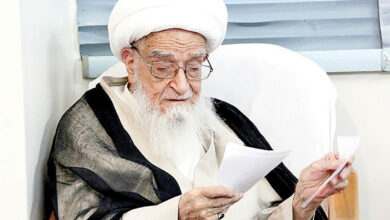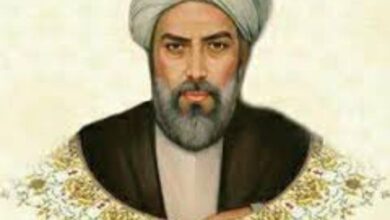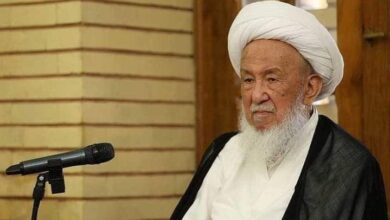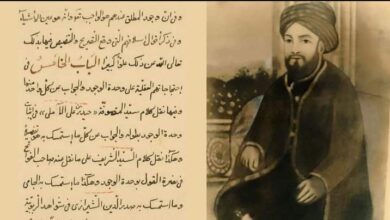Material resurrection and return of the extinct – Grand Ayatollah Nasir Makarem Shirazi
Resurrection: spiritual or material?
Resurrection of physical body does not mean that only the body will be restored on the day of judgment, rather it means that both the soul and the material body will be returned. While all scholars agree on the return of the soul, the material resurrection is subject of dispute.
Some of the philosophers only believe in spiritual resurrection. They consider the body to be a container that accompanies man only in this world, and after death, the soul abandons the body and migrates to a spiritual world. But the great theologians of Islam always held that resurrection shall be both spiritual and material.
Some philosophers (like Mulla Sadra) do believe in return of the body, but they speculate that non-material bodies will be created for the afterlife. Because the essence of humans is the soul, and therefore it shall be reincarnated in a non-material body in the hereafter. Once associated with the soul, this imaginal body could be identified as their own body.
But the specialists of theology (like Nasiruddin Tusi) believe that the same material body whose particles have been scattered, shall be revitalised by the will of God. So the same cells shall be restored to start a new life. This is the belief that appears explicitly in the Quran.
There are so many evidences in the holy Qur’an about the physical resurrection that it can be said with certainty that those who believe in the spiritual resurrection only, have not given the slightest thought to most of the verses of the holy Qur’an. Otherwise, there are so many verses in the holy Qur’an supporting resurrection of the material body that there is no room for doubt.
The last verses of chapter Yasin make this fact perfectly clear because the nomadic Arab was wondering how could the decayed bone in his hand be revived. The holy Qur’an responds in very clear words:
قُلْ يُحْيِيهَا ٱلَّذِىٓ أَنشَأَهَآ أَوَّلَ مَرَّةٍۢ ۖ وَهُوَ بِكُلِّ خَلْقٍ عَلِيمٌ ○ (سورہ یٰس، آیت ۷۹)
Translation: “Say: they will be revived by the One Who created them the first time, for He has perfect knowledge of every created being.” (36: 79)
All the polytheists were wondering about the matter of physical resurrection, that when we become dust and our particles are also spread here and there in the earth, how can we be resurrected? The holy Qur’an mentions their opinion:
وَقَالُوا ءِاذَا ضَلَلْنَا فِی الْاٴَرْضِ ءَاِنَّا لَفِی خَلْقٍ جَدِیدٍ ○ (سورہ حٰم سجدہ، آیت ۱۰)
Translation: “And the disbelievers say: ‘When we are lost in the earth, shall we then be created anew?’ In fact, they deny the meeting with their Lord.” (32 : 10)
They used to say:
اٴَیَعِدُکُمْ اٴَنَّکُمْ إِذَا مِتُّمْ وَکُنتُمْ تُرَابًا وَ عِظَامًا اٴَنَّکُمْ مُخْرَجُونَ ○ (سورہ مؤمنون، آیت ۳۵)
Translation: “Does he promise you that once you are dead and reduced to dust and bones, you will be brought forth alive?” (23: 35)
The infidels and polytheists used to be so dubious about the day of judgment that they considered those who believed it to be slanderers and lunatics.The holy Qur’an mentions it:
وَقَالَ الَّذِینَ کَفَرُوا ہَلْ نَدُلُّکُمْ عَلَی رَجُلٍ یُنَبِّئُکُمْ إِذَا مُزِّقْتُمْ کُلَّ مُمَزَّقٍ إِنَّکُمْ لَفِی خَلْقٍ جَدِیدٍ ○ (سورہ سباء، آیت ۷)
Translation: “The disbelievers say: Shall we show you a man who claims that when you have been utterly disintegrated, you will be raised as a new creation?” (34: 7)
The Qur’an argues in favour of the material rebirth. In addition, the holy Quran has repeatedly reminded that you humans will come out of your graves on the day of judgment. See, for example, (36: 5), (54: 7). The word “graves” indicates material resurrection. We know that grave is the place of bodies which have become dust, not the place of the spirits.
Many spiritual and material attributes of heaven have been described in the Holy Qur’an, all of which point to the fact that both the body and the soul should be present on the day of judgment, otherwise the virgin companions (houris), the adolescent servants (ghilman), palaces, heavenly foods and material pleasures would be meaningless.
It is not possible for someone who is familiar with the logic and structure of the holy Qur’an to deny material resurrection. Or in other words, according to the Qur’anic worldview, the denial of material resurrection is denial of resurrection itself.
In this regard, apart from the arguments presented in Qur’an and Hadith, there are other rational arguments that if we want to present them, the discussion will become cumbersome. Anyhow, now we discuss the resurrection of the consumed body. (1)
The story of Prophet Ibrahim (PBUH)
Many interpreters and historian have mentioned the story of prophet Ibrahim (PBUH) in context of this verse:
وَإِذۡ قَالَ إِبۡرَٰهِـۧمُ رَبِّ أَرِنِي كَيۡفَ تُحۡيِ ٱلۡمَوۡتَىٰۖ قَالَ أَوَلَمۡ تُؤۡمِنۖ قَالَ بَلَىٰ وَلَٰكِن لِّيَطۡمَئِنَّ قَلۡبِيۖ قَالَ فَخُذۡ أَرۡبَعَةٗ مِّنَ ٱلطَّيۡرِ فَصُرۡهُنَّ إِلَيۡكَ ثُمَّ ٱجۡعَلۡ عَلَىٰ كُلِّ جَبَلٖ مِّنۡهُنَّ جُزۡءٗا ثُمَّ ٱدۡعُهُنَّ يَأۡتِينَكَ سَعۡيٗاۚ وَٱعۡلَمۡ أَنَّ ٱللَّهَ عَزِيزٌ حَكِيمٞ ○ (سورہ بقرہ، آیت ۲۶۰)
Translation: “When Ibrahim said: O God, show me how you bring the dead back to life, God responded, Do you not believe?’ He said, I do, but I wish my heart to be reassured.’ So God said, `Choose four types of birds, and mix their flesh together, and place portions on the top of mountains. Then summon the birds, and they will come hastening to you. You will then know that God is empowered over all things and is aware of the truth of all things.” (2:260)
One day prophet Ibrahim (PBUH) was passing by a river. He saw the body of a dead animal on the bank, part of which was inside the river and part outside. Animals from both the river and the land were eating it. Moreover, they were fighting over it.
This scene made prophet Ibrahim (PBUH) think about a problem that everyone wants to explore in detail and that is the condition of the dead coming back to life after death.
Prophet Ibrahim (PBUH) began to wonder what if the same thing happens to the human body and it becomes part of the animal body, then how will it be revitalized in the resurrection? While in the hereafter, a person has to rise with the same material body.
Prophet Ibrahim (PBUH) said: “Lord! show me how will you raise the dead? God Almighty said: do you not believe in this? He said: I have faith but I want my mind to be satisfied.”
God ordered him to take four birds and slaughter them and mix their meat. Then divide this combined meat into several parts. Place each part on a separate mountain. After that, call these birds to see them fly back alive.
He did so and saw with great surprise that the particles of the birds gathered from different places and they came flying to him, starting a new life.
The paradox of the consumed body
The reason why Prophet Ibrahim (PBUH) requested to witness the scene of the resurrection of the dead has been explained in detail. From which it is clear that Prophet Ibrahim (PBUH) wanted to see how the body of an animal that became part of the body of other animals, could return to its original form? In theology, this is called the paradox of the consumed body (شبهة الآكل والمأكول).
The paradox is as follows: if we say that God will return humans with the same material body in the resurrection, both body and soul together, a problem arises when a person’s body decays after death, and its particles are absorbed through the roots of trees and become part of fruits and vegetables. And then another person eats those fruits or vegetables and they become part of his body.
Or, for example, if a person eats the flesh of another person during a famine, then on the day of judgment, which of the two bodies will the particles become part of? If they become part of the first body, then the second body will become defective, and if the second body is made of these particles, then the first will remain incomplete.
Answer
Scholars of theology have given different answers to this ancient objection. It is not necessary to discuss every one of them here. There are some scholars who could not give a satisfactory answer. That is why they had to interpret the verses related to the return of the body allegorically and they said that the true self of humans is their soul and spiritual attributes.
But, the human personality is not only the soul, nor are the verses related to the return of the body such that they can be interpreted allegorically. Rather, as we have already explained, the verses argue quite clearly in favour of material resurrection.
Some philosophers came up with the idea of resurrection of an imaginal body, which apparently explains physical resurrection, but it is not significantly different from the spiritual resurrection.
We will examine the issue here in the light of the holy Qur’an, following a clear path to an answer which is also compatible with modern science. However, to explain it, there is need to ponder on few facts:
1. We know that the cells of the human body change repeatedly from infancy to death. Even brain cells, though not much in numbers, still change in composition. Nutrients enter the cells and certain products of metabolism, leave as waste materials. On the other hand they continue to break and replaced by new cells.
In summary, in less then ten years, nothing is left of the previous cells of the human body. It should be noted that when some cells leave for the valley of death, all their properties and traces are carried into new and fresh cells.
This is the reason why all the characteristics of human body, from color and appearance to other physical traits, remain in place over time. And this is because properties of old cells are transferred to new cells.
Therefore, the last cells of every human being, which turn into dust after death, have all the attributes that they have acquired throughout the life. And these attributes are the record of the entire life of that particular body, which ends up in the grave.
2. The essence of human personality is the soul. But it should be noted that the soul is nurtured along with the body, and the evolution and progress of soul and body depend on each other.
Just as two bodies do not resemble each other in all respects, no two souls are identical.
Therefore, no soul can survive without full compatibility with and function of the body with which it has been nurtured and developed.
Therefore, it is necessary that the same former body returns in the resurrection, so that the soul can start its activity anew in the higher stages and be blessed with the rewards of its deeds.
3. Every cell of the human body has all the physical information about the body. That is, if we actually take a cell from a body and make a complete human from it, then that human will have all the attributes of the person whose part was taken.
In the beginning of life, a human is not more than a single cell. The first cell is made from the sperm and egg of the parents. It had all the potentials of a human being. Gradually it divides and becomes two cells. Then two become four and gradually all the cells of the human body come into being.
Therefore, all the cells of the human body are like the first cell, if they are nurtured like the first cell, then each one will be a complete human being in every respect. Which will definitely have the qualities of the human being born from the first cell.
It is clear from our discussion that such a body does not raise any objection to the possibility of physical rebirth and the verses in which this meaning is clearly stated do not need allegorical interpretation. (2)
References:
1. Grand Ayatollah Naser Makarem Shirazi, “Tafsir Nemooneh”, vol. 18, p. 487.
2. Grand Ayatollah Naser Makarem Shirazi, “Tafsir Nemooneh”, vol. 2, p. 223.



